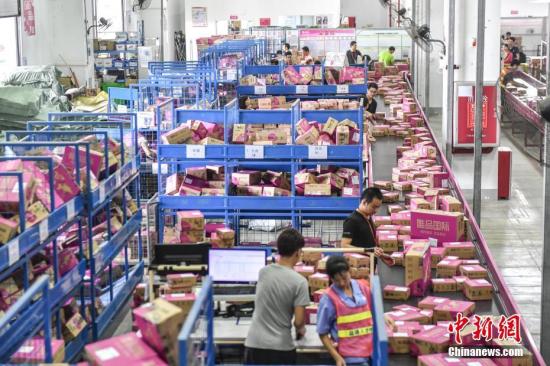China News Service, January 4th. According to the website of the General Administration of Customs, in 2020, 2.45 billion import and export invoices will be released through the customs cross-border e-commerce management platform, a year-on-year increase of 63.3%.
Data map: The staff is sorting goods.
Photo by China News Agency reporter Chen Jimin
Cross-border e-commerce relies on online non-contact transactions and are less affected by the epidemic. At the same time, some offline transactions are also transferred online due to the epidemic.
The substantial growth of cross-border e-commerce business has brought huge challenges to customs supervision, especially during the year-end and early-year e-commerce promotion period, how to ensure that the e-commerce parcels are delivered to everyone accurately and in time while doing a good job in the prevention and control of the epidemic Consumers have become a problem that must be solved before the customs.
In order to ensure the rapid customs clearance of cross-border e-commerce entry and exit during the New Year’s E-commerce promotion period, the customs has been actively taking measures and planning the layout since the beginning of October last year.
Actively visit some e-commerce platforms and e-commerce companies to learn about the company’s promotion plans, product categories and estimated sales in advance, and formulate specific work plans such as personnel on duty, system guarantee, and business guidance. At the same time, it strengthens technological innovation and model innovation to ensure practical protection Customs clearance efficiency of cross-border e-commerce products.
The Jiangsu, Zhejiang and Shanghai region is one of the central areas of global e-commerce. Many cross-border e-commerce companies gather here to introduce global high-quality goods into China through the Internet, or sell domestic high-quality goods to all over the world.
In order to support the demand for large-volume shipments during the peak season at the end of the year and the beginning of the year, Hangzhou Customs has strengthened coordination and communication with air port and shore supervision operations in advance, set up special areas for storage of cross-border e-commerce goods, and opened up special channels for cross-border e-commerce goods to ensure uninterrupted customs clearance. Barrier-free; early docking with airlines and logistics companies, timely access to logistics trends, to ensure that cross-border e-commerce goods are delivered immediately upon arrival.
As the largest cross-border e-commerce park in the country with the most complete product categories, the China (Hangzhou) Cross-border E-commerce Comprehensive Pilot Zone (Xiasha Park) will stock up to 46 million units during the Double Eleven in 2020, an increase of 11% year-on-year. It is more abundant than in previous years, with sources all over Japan, South Korea, Germany and other countries and regions.
In the early morning of December 10, 2020, the workplace of Hangzhou Kaida Supply Chain Management Co., Ltd. was still brightly lit. Since late October last year, this supply chain company ushered in the busiest time of the year. Of cross-border e-commerce companies handle customs declaration procedures for 30 batches of goods worth 5 million yuan.
As one of the leading cities in reform and opening up, Shanghai's e-commerce promotion at the end of the year met with the 30th anniversary of Pudong's opening up and the third China International Import Expo, which is of great significance.
Shanghai Customs has established a special task force for cross-border e-commerce customs clearance protection and a party member commando team to work overtime to support the cross-border e-commerce front-line supervision site and ensure sufficient human resources for on-site supervision.
Organize special personnel to investigate customs clearance related systems, equipment, and networks in advance, promptly replace inefficient and old equipment, and strengthen the 24-hour uninterrupted customs clearance duty guarantee.
Shanghai Jisen Warehousing is the only warehousing and logistics service provider of Tmall International in Shanghai. Every year at the end of the year, the big promotion is the battlefield for enterprises to fight every second.
At the Nanjing Airport cross-border e-commerce supervision site, before vehicles loaded with e-commerce export goods enter the venue, the drivers will take out their mobile phones to scan a QR code, and then the bayonet will automatically let the vehicles enter the venue.
It is understood that through this system, companies do not need to run errands everywhere, as long as they fill in data once, they can go through customs clearance procedures without feeling, greatly reducing the labor cost and time cost of the logistics link.
The Pearl River Delta region is adjacent to Hong Kong, Macau and Southeast Asia. Traditional manufacturing and water and land transportation are relatively developed. The rise of cross-border e-commerce provides a new way for "Made in China" to be sold globally.
It is understood that cross-border e-commerce in Guangdong is currently export-oriented, and more than 70% of cross-border e-commerce exports across the country are sold throughout the world through the Pearl River Delta region.
In order to cooperate with the smooth customs clearance of Guangdong-made goods, the customs in Guangdong region closely leveraged the advantages of the location industry and innovated in management and mode, effectively improving the efficiency of e-commerce customs clearance.
According to Huangpu Customs, in order to promote the high-quality development of cross-border e-commerce exports in customs areas and serve the upgrading and transformation of the local economy, Huangpu Customs has specially formulated 8 measures and strengthened system integration. It has taken the lead in launching a 24-hour customs clearance model for e-commerce exports. Regional logistics are seamlessly connected.
The customs also includes cross-border e-commerce B2B exports and cross-border e-commerce import and export returns into the scope of customs clearance services.
By ensuring the timeliness of B2B export customs clearance, the customs further supports enterprises in expanding e-commerce bulk export business, helping small, medium and micro enterprises to further reduce costs, allowing consumers to "buy with confidence" and export companies to "sell with confidence", which is good for positive consumption Stimulating effect.

